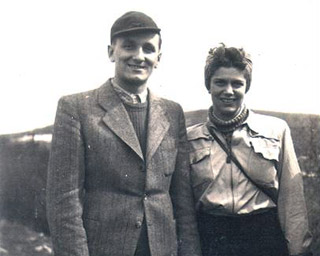Béla Stollár
Hungary
Éva Deák:
Excerpt from the letter to Sári Ferencz
Budapest, January 24, 1946
(translated from Hungarian)
[...]
Then, on the 19th of March, 1944, the German Army invaded and occupied Hungary. We were just celebrating the 7th anniversary of our friendship in Kiskörös, where Roxan's husband was a judge. Two days later, on a terrible morning, they took father from home, and the Germans interned him as a hostage. A few weeks later, the wearing of a yellow star was ordered for all Jews. We did not really suffer from that: there were much bigger problems. I remember all the troubles: how Pityu got beaten up on the street, how we were afraid of the police, how I did not dare to appear with Béla on the street, how acquaintances were afraid to acknowledge us in public, how we had to do all shopping between 11 AM and 1 PM, how we were not allowed to use the telephone, and had to use the end of the tram. We still were doing okay, but in the country they started the deportations, and our family from Fehérvár was taken away (in part they survived). In June, they passed orders that all Jews must live in houses marked with yellow stars. At that point life became life threatening to us, and my mother and I went into hiding. Pityu was in Army labor-camp in Transylvania, in very bad conditions. Béla obtained false papers for all of us and took mother to Miskolc for a "vacation". She stayed there till September, when my father was released. I went to work for a German baroness as a governess for 3 children in the Danube-Tisza countryside. I had a good life; they liked me, I liked them, and they never found out that I was Jewish. Béla helped our entire family in hiding, and really everybody who asked him: army deserters, communists, or Jews. He lived in constant danger of getting killed, he organized resistance, spread pamphlets and wrote slogans on the walls at night. I found all of this out after he came to an end. Now, he has become a national hero, and the house where he got killed now has a plaque. He is memorialized at assemblies and in the newspapers. But how I hate "heroism"!
I continue my story: in September father was released, and when on October 15 Governor Horthy declared armistice, my brother Pityu escaped from his labor battalion. The family of the German baron and I came up from the country to Budapest, fleeing from the advancing Russians. On October 16, the Szálasi group (the fascist Hungarian party) took power in Budapest, set up the ghetto, deported and killed masses of Jews from Pest. Every night, they took groups of naked men to the side of the Danube, and shot them into the river.
In November, my grandmother (Mom 's mother), 75 years old, was forced to walk towards Germany for 6 days in cold rain. We could not help her. Béla even went to the brick factory where she was kept earlier in staff officers' uniform to get her out, but could not find her. We know that poor soul got as far as Gy?r, but we know nothing beyond that. They either shot her, or she just died on the road. We were convinced that we would not get away with our hiding, but miraculously we managed to survive.
Christmas afternoon, Béla left home to the resistance group he organized. They tried to save the printing presses of Pesti Hirlap (a daily paper) from the Germans. But there must have been a leak, and truckloads of fascists surrounded them 5 minutes after they got there, and all of them were killed. Béla fought for hour and a half with grenades and a gun. That evening, I waited in vain. On that day, the Russians closed the circle around Budapest, and the siege began. I went to look for Béla, running around for a week to find out what had happened. The streets were empty except for soldiers and guns. Of course there was no transportation or telephone, and all men except soldiers were in hiding. The fascists were wild. I looked for him in the Nyilasház (Facsist Center), at the police, until finally the clues led me to the house on Clotild St where he was killed.
[...]
